If Rod Serling were alive and living on the Island, the voice-over might go something like this: “You are sitting at a small table, in a small town, on a small Island off the coast of a small New England state. You are Mrs. X and you are talking to Mr. X. The words he is about to hear will change your lives. Beyond meaning, words can have power, and the power these words hold is about to begin an expansion of consciousness – for the young couple, for the small town, the small Island, and beyond. The words are these: ‘Maybe we should get a cow?’ Now you have entered…The Mermaid Zone.”
As with many of the places depicted in Serling’s legendary Twilight Zone franchise, Mermaid Farm – the dairy and vegetable farm located on Middle Road in Chilmark – can feel like a world unto itself, out of step with the march of time.
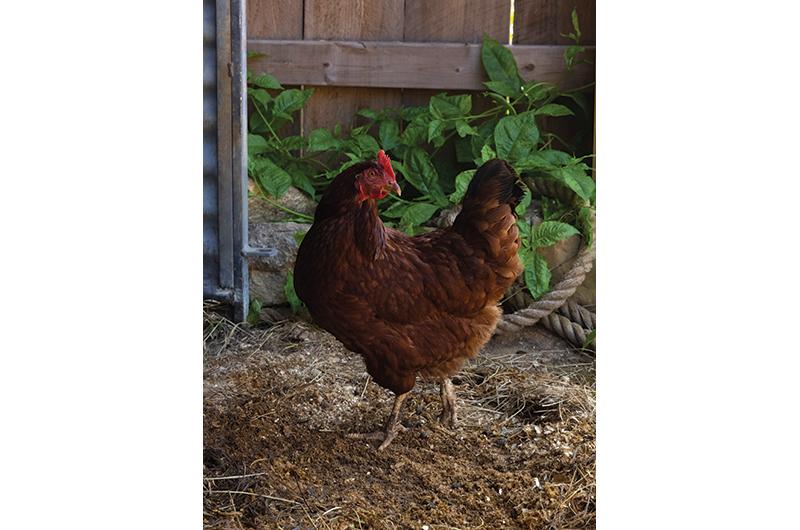
It has been said that many hands make light work, but on this expansive plot of land it takes more than hands. There are worms that till and aerate the soil. Ducks that patrol the grounds. Mother cows that bellow for days and nights in the line of duty missing their young, who bellow back. There is Tex, the blind border collie who is in charge of fetching the stick, or at least barking at it down at the stand. There are the barn swallows that are eagerly awaited every spring, along with the catbirds, goldfinches, bluebirds, and hummingbirds. There are the crows that stay year-round marking the four corners of the property every morning with arithmetic caws. One calls, “Caw caw, caw.” The other answers with the same count.
We can’t omit the chickens – they won’t allow it – especially Saltiny, named after his father, Saltine. This rooster, being smaller, was given the diminutive appellation, which is misleading because every morning when the Decorative Hermit, one of the many farm residents, goes to open the coop and feed the brood, Saltiny runs out, stops in his tracks, looks around a bit, kicks back his shoulders, and lets out an Olympian crow that perhaps is also felt in the small town, the small Island, the small state.
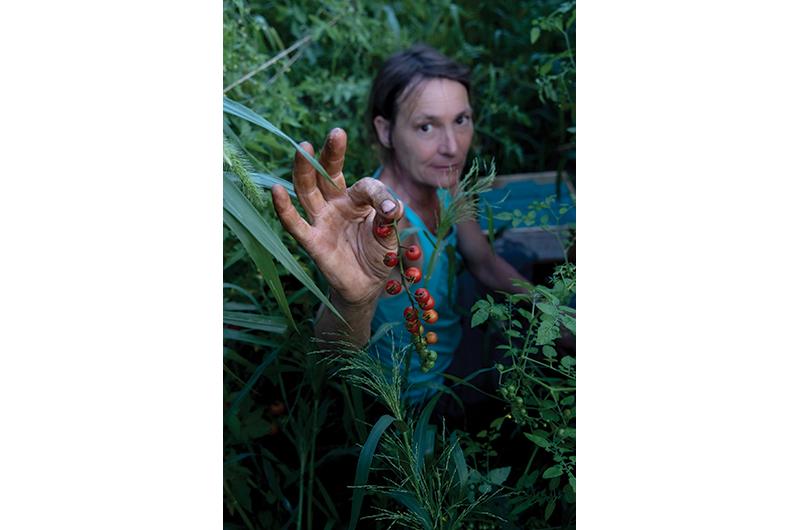
Caitlin Jones and Allen Healy share the helm. They both have deep ties to the Island. Healy’s mother is related to the Flanders line, and Jones to the Howes family – as in the Howes House in West Tisbury. Her great-grandfather Joseph E. Howes farmed the Tea Lane Farm, just up the road from Mermaid. It is Jones and Healy who are the Mrs. and Mr. X. who first considered the question of the cow sometime in the early 2000s. As a young couple they decided on the cow idea so they could give their children healthy milk and homemade dairy products. Little did they know then that their endeavors would morph into what is now one of the favorite destinations for those seeking organically grown produce and dairy products, and a haven for a variety of characters who have over the years come to work and live on the farm.
One such character we’ll call the Chicken Man, though he actually is in charge of fixing the equipment that, as on all farms, perpetually breaks down. He can be called the Chicken Man because, for a while, he was in charge of the flock destined for Island stomachs as part of the farm-to-toilet movement. Every day he would arrive early, and if you were in his proximity, you could hear as he talked to the group destined for the butcher’s blade. “What? What!? What’s going on up here? What do you want?” he would implore, and the all-white flock would respond in their way: “Cluck, cluck, cluck.” As if reciting the lines of an age-old chicken theatrical production. The Chicken Man recited his lines as well. “What are you talking about? I don’t speak chicken! What do you want? Food? Again? What happened to the food I gave you yesterday?”
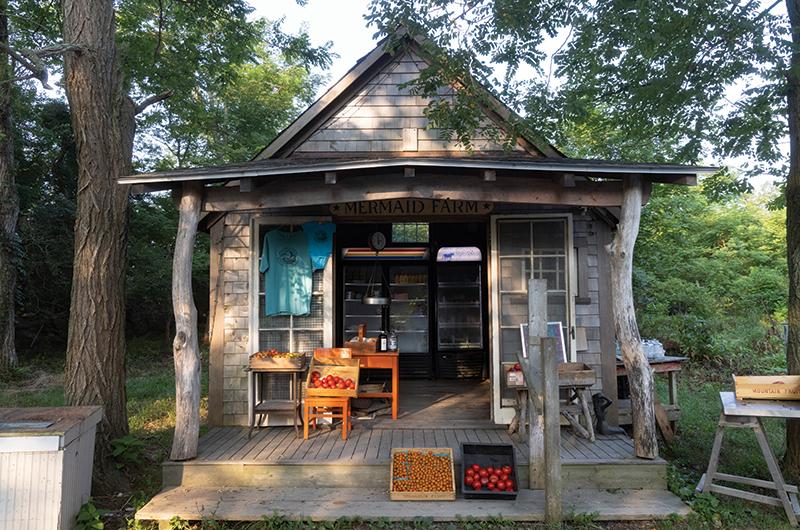
The conversation would continue until he was done with the feeding chore and drove back to the barn to work on the wheel bearings of the old Ford tractor. There he would inevitably encounter the younger son of the farm, who has a penchant for dirt bikes. The son would motor around looking like a Shriner in a go-cart as he, six feet tall at seventeen, rode the smallest of dirt bikes. Up and back and up and back and up and back near the Decorative Hermit’s domain, as if his task were to keep peace and calm at bay.
Work on the farm can be joyous but also unrelenting. Jones, whose prowess in the realm of plants is perhaps unmatched, takes care of the crops, the birds, the sheep, her dog, the worms, and, with great love, the catbirds. She has come to understand the voices of trees. Healy takes care of the cows and the livestock along with “the boys,” a group of man-beings that frequent the barn, including the two sons of the farm, Kent and Everett.
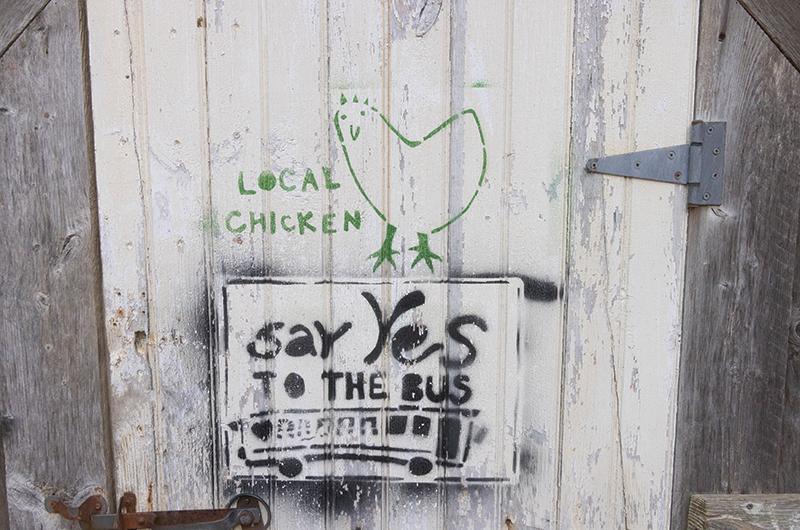
Others come and go. Farms have a way of attracting people, for better or worse. It’s kind of a “if you can’t take the heat, get out of the kitchen” kind of thing. Some come and bond with the place, the land, and its creatures, the travail. Some come and it is soon recognized they don’t quite fit. The kid who was given shelter and proceeded to trash the joint, for example. The Decorative Hermit noticed that the kid was a bit of a junior scammer, one with a tendency to blow smoke up whoever’s derriere was nearby. The kid would approach and say, “Hey man, how’s it going? Would you have a butt you could spare? Don’t worry, I’ll get you a pack.” The pack never came even as the queries continued. As it happened, the junior scammer left the collective, but later, the Decorative Hermit was in town at the bus stop when who should show up? And what was the question? “Hey man, can you spare a butt?”
Though seemingly operating in a different time and dimension, some of the same natural laws that apply Island-wide also apply here. If the Island wants you, you will stay. If not, you won’t. Mermaid tends to find nice people – the cooperative sorts. Take the Bus People, for instance.
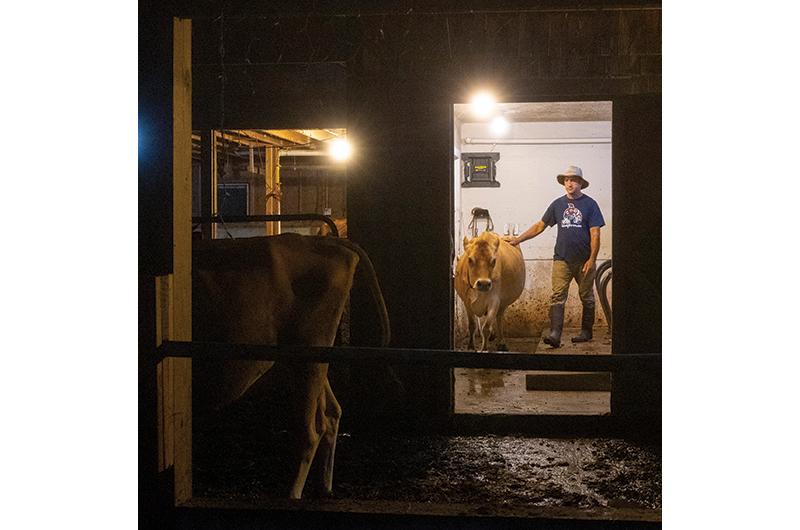
One summer day the Bus People showed up in their old Blue Bird bus and told Jones that they needed a place to park. Jones, using her Druidic discernment, scoped them out quietly and said, “Sure, how about over there?” They were allowed to stay for a week or so: the woman, a yoga teacher; the man, a comedy improv teacher; the young boy, whose task it was to be a young boy; and the adolescent girl, whose pursuit became mesmerizing the younger lads of the enclave.
They all pitched in, but there was a bit of a dust-up as to whether it was a good idea for them to remain long-term. Thus was born the “Say Yes to the Bus” campaign. A stencil was created by someone with those words and spray-painted signs started to appear mysteriously on vehicles, storage containers, and even on the bus itself. It was similar to when another spray-painted sign that said “Local Chicken,” with a picture of a chicken, began to show up on vehicles and various other places on the farm. It was obviously some artist’s version of crop circles, appearing out of thin air, much like the signs out on the drive in that say, “Go Slow, Catbirds in Road.”
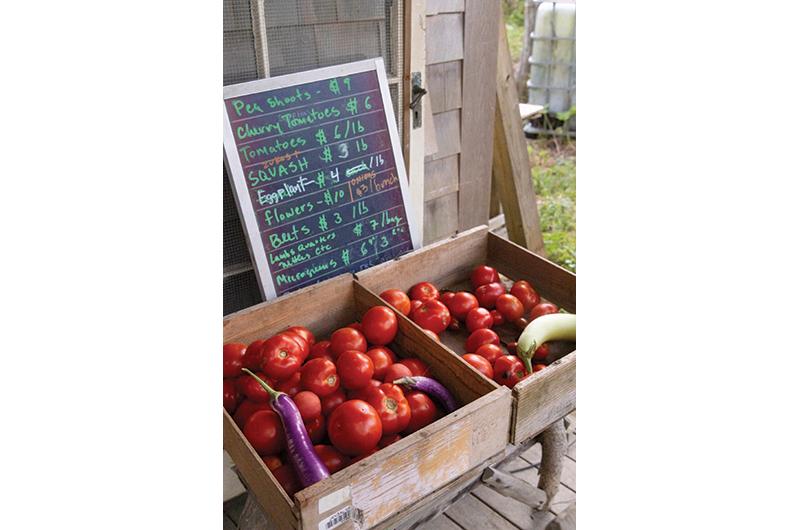
The word that best describes the farm is fecundity. It applies to all the beings that abide or pass through the land. Plants, cows, mushrooms, ducks, ants, worms, mealy bugs, and, of course, the birds and the bees. Each does their part. Some go a little overboard.
One in particular is the duck that Jones found near her mother’s house, wandering around incessantly quacking. This boy epitomizes fecundity – or at least the attempt to achieve it. There were already ducks abiding on the land, all females approaching elderly duck status, but that fact didn’t sway the new boy. On any day, any time of day, he could be seen chasing one of the ladies, often with success and, it seemed, often to the delight of the older lady ducks, who never could be perceived as being jealous or holding grudges with each other. One day the duck approached the Decorative Hermit with a glint in his eye and a rapid succession of quacks. Needless to say, the Decorative Hermit declined the advance.
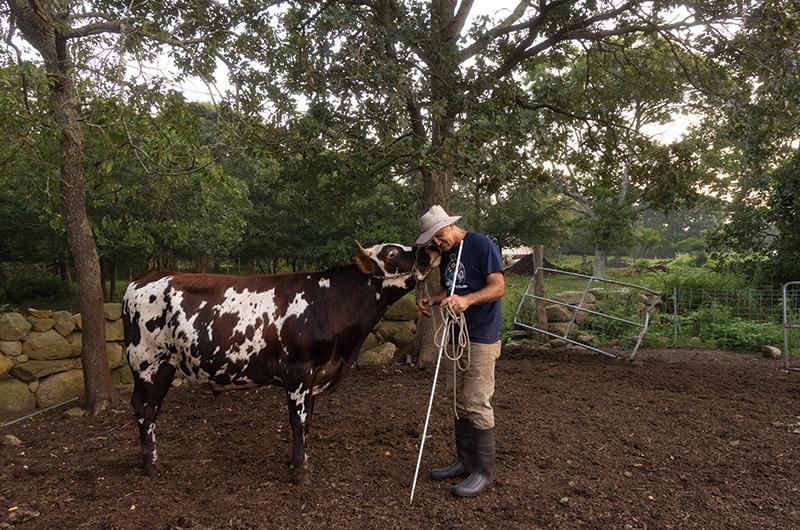
One soul who has been denied the opportunity to advance the cause of fecundity is the youngish ox of a farmhand we might call the Morning Milker. The Morning Milker has a way with animals – cows in particular. The ox was once a bull, but was neutered when young. Early one morning the Decorative Hermit was doing his morning chicken chores and discovered him training the lad. The Morning Milker alternately used some force and a rope and then would sing and pet and coo to him.
Generally, like roosters, there isn’t much room for bulls on a farm. They can become aggressive and competitive with each other. The Decorative Hermit, curious as to the condition of the animal, who he thought was still a bull, approached and asked if he still had all of his original parts.
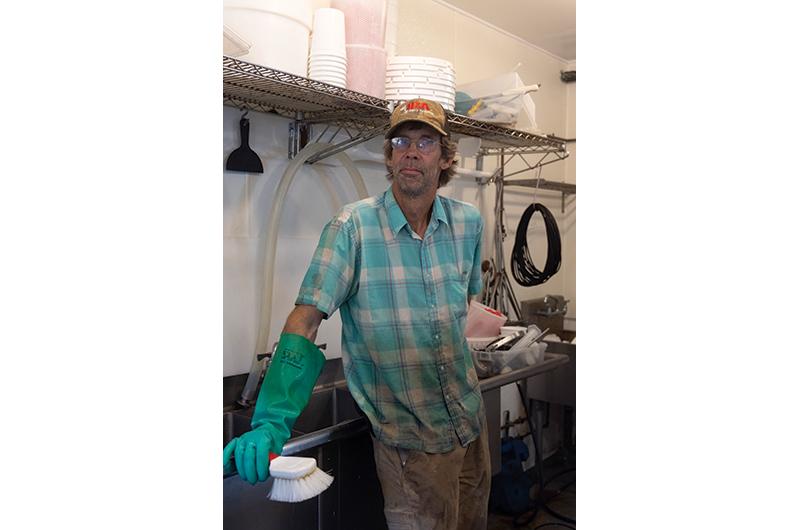
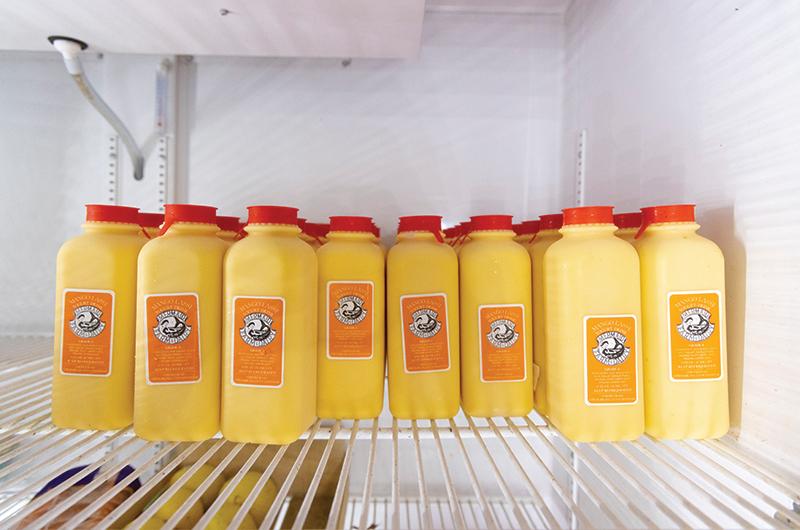
“No,” came the reply. “I take them out already.”
“Well, he does seem calm.”
“Yes, they’re all different. This one, he is good boy.”
The Morning Milker has two oxen, in fact. The other one he keeps in Vineyard Haven, where he can often be seen walking the ox on a leash down Edgartown–Vineyard Haven Road. When asked the names of the pair, the Morning Milker proudly states, “This one, the red one, he is called the city over there.” He points north. “You know the city…Chilmark City. And the other, the painted one, he is Titanic, like, you know, the big ship that go down.”
Clearly, the Morning Milker fits in on the farm.
There are other young bulls of the human variety. At one point three college-age girls showed up to help Jones in the garden and yet another piece of the puzzle, and another important concept of farming, was evidenced: hormones. The girls had a penchant for working somewhat scantily clad; one was even seen milking in her undergarments. To the Decorative Hermit and the other elders on the farm, this was a non-issue as they had come of age in the seventies when skinny-dipping and streaking were all the rage.
But for the young bucks, well, that was a different story. Strange transformations took place. One boy, who had a penchant for heavy equipment and trucks and loathed working in the fields, could suddenly be found volunteering to plant vegetables and pick flowers when the girl from the bus was engaged in that activity. She became the focus of a bit of a rivalry, which caused another boy to abandon his solitary ways and mill about. Still, work got done amidst the flirting. Fecundity was achieved.
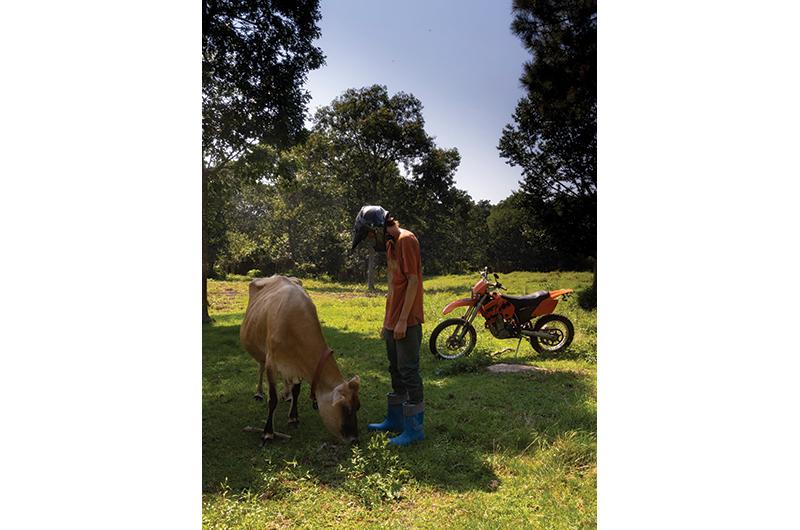
Not all the helpers on the farm have been held sway by hormone eruptions. Jones, like many who strive for abundance to help feed the community and feel the need to get things done in a timely fashion, was particularly impressed by the young girl who helped stock the farm stand. Serious, quiet, not one to stop and chat,
it was clear that she took her job of driving goods in the buggy up to the stand as a high honor and grave responsibility. She was one serious worker.
And, speaking of the buggy, for a while there were twin boys, aged around eight, who helped a bit. But it was clear it was all about the buggy: a small cart that goes about ten miles an hour. The speed limit didn’t bother the twins as they zoomed up and down the road. They discovered other paths on the farm, and soon they were following the example of the dirt bike-riding younger son going ’round and ’round and ’round. A certain glee was observed, which caused Jones to refer to them as a doubling of the Mickey Mouse character as the sorcerer’s apprentice, sans the pointy hats.
Life on the farm is just that: life. It teems in the form of bees flying lovingly from flower to flower. Worms underground dutifully helping the microorganisms thrive. Mealy bugs uncountable, appearing under everything in the thousands. All the birds that return each year to spend time with Jones. The cows that give Healy the milk with which he makes the yogurt, and which he bottles raw, to the delight of the community. The Chicken Man. The Morning Milker. The Suspected Homeless Guy, who no one has ever seen but who is blamed when something goes missing: a tool, an item from the farm stand, what have you. And there is the Decorative Hermit, who takes on miscellaneous tasks, one of which has been letting out the chickens and feeding them. It is a small task, for sure, but one that makes him feel more connected to this family of beings, here on this small farm, in this small town, on this small Island.

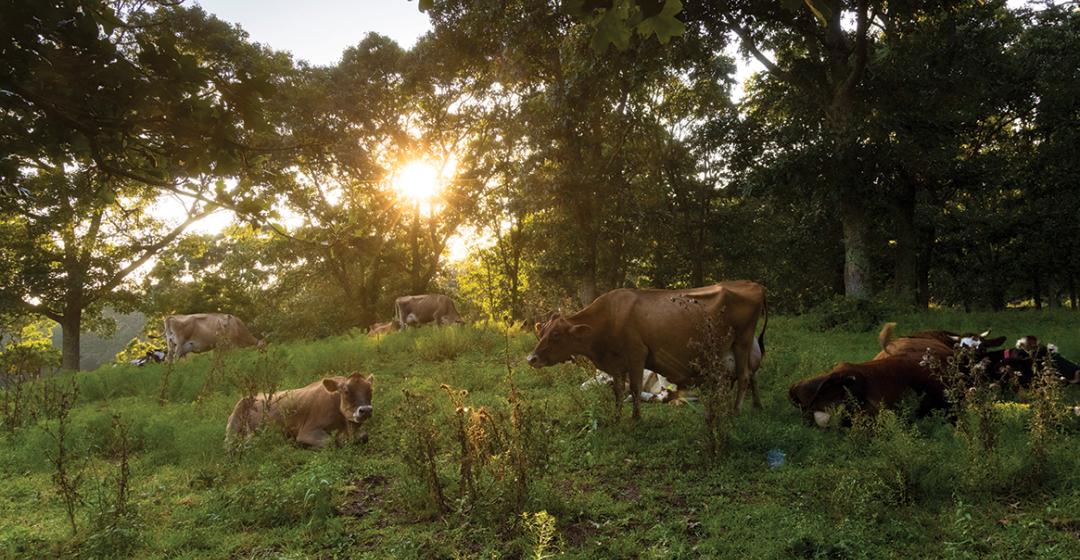


 2 comments
2 comments
Comments (2)